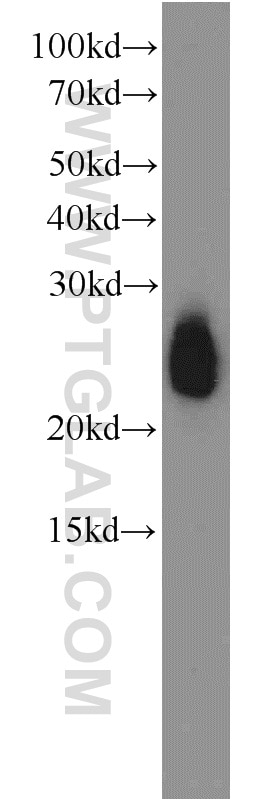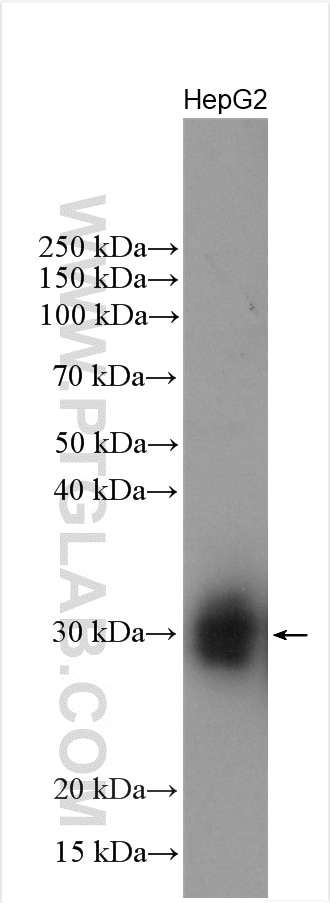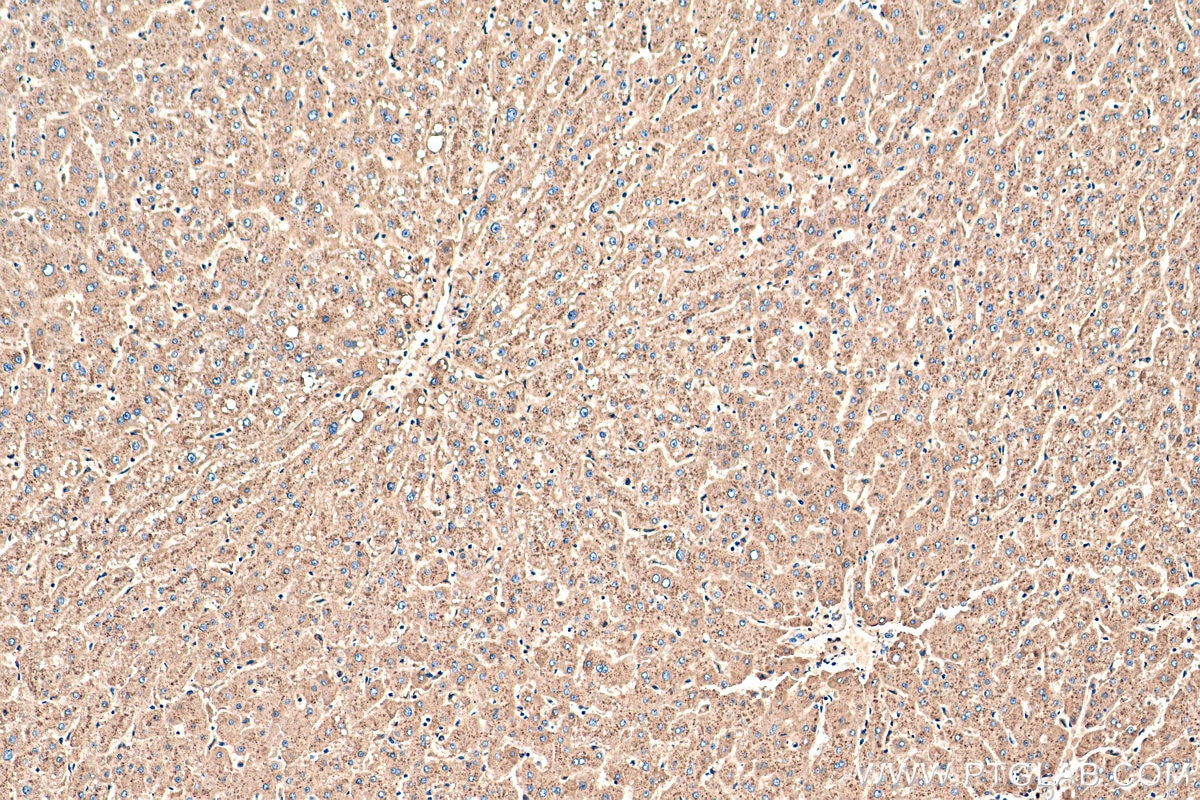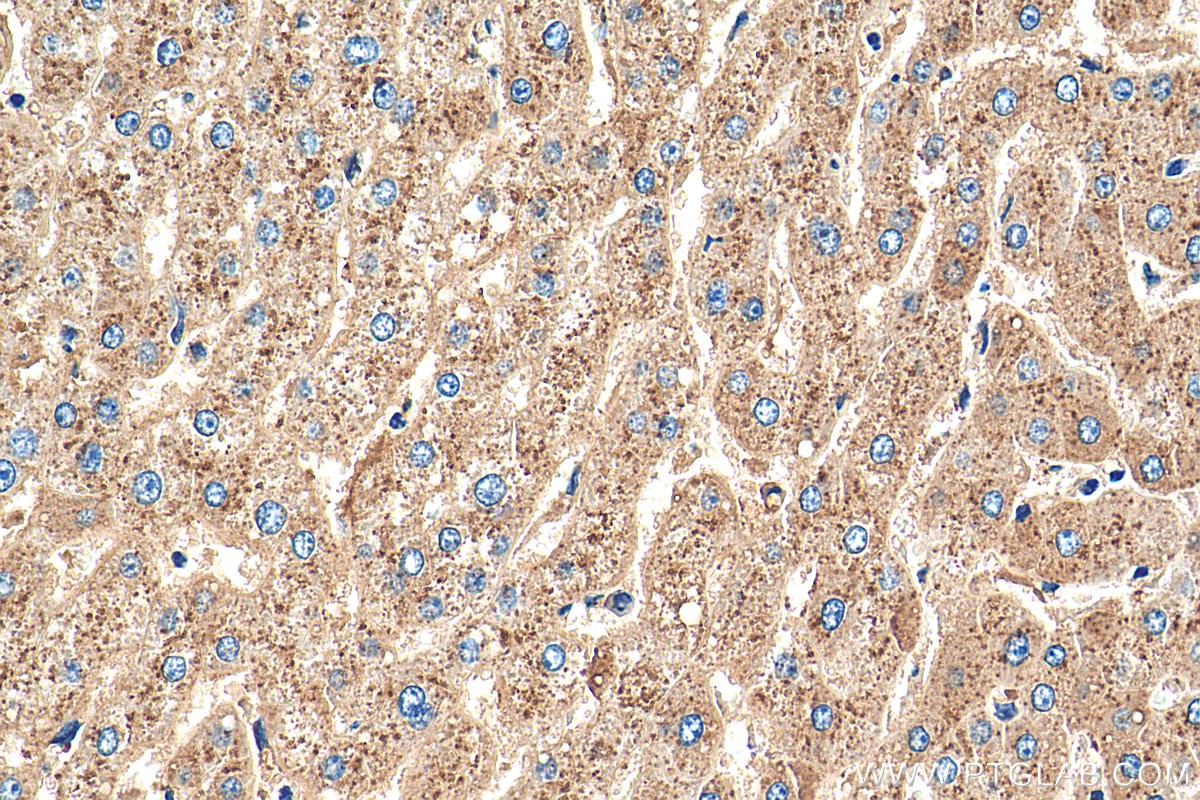- Featured Product
- KD/KO Validated
APOD Polyklonaler Antikörper
APOD Polyklonal Antikörper für WB, IHC, ELISA
Wirt / Isotyp
Kaninchen / IgG
Getestete Reaktivität
human
Anwendung
WB, IHC, ELISA
Konjugation
Unkonjugiert
Kat-Nr. : 10520-1-AP
Synonyme
Galerie der Validierungsdaten
Geprüfte Anwendungen
| Erfolgreiche Detektion in WB | humanes Serumgewebe, HepG2-Zellen |
| Erfolgreiche Detektion in IHC | humanes Lebergewebe Hinweis: Antigendemaskierung mit TE-Puffer pH 9,0 empfohlen. (*) Wahlweise kann die Antigendemaskierung auch mit Citratpuffer pH 6,0 erfolgen. |
Empfohlene Verdünnung
| Anwendung | Verdünnung |
|---|---|
| Western Blot (WB) | WB : 1:500-1:1000 |
| Immunhistochemie (IHC) | IHC : 1:50-1:500 |
| It is recommended that this reagent should be titrated in each testing system to obtain optimal results. | |
| Sample-dependent, check data in validation data gallery | |
Veröffentlichte Anwendungen
| KD/KO | See 1 publications below |
| WB | See 3 publications below |
| IHC | See 4 publications below |
Produktinformation
10520-1-AP bindet in WB, IHC, ELISA APOD und zeigt Reaktivität mit human
| Getestete Reaktivität | human |
| In Publikationen genannte Reaktivität | human |
| Wirt / Isotyp | Kaninchen / IgG |
| Klonalität | Polyklonal |
| Typ | Antikörper |
| Immunogen | APOD fusion protein Ag0812 |
| Vollständiger Name | apolipoprotein D |
| Berechnetes Molekulargewicht | 33 kDa |
| Beobachtetes Molekulargewicht | 21-33 kDa |
| GenBank-Zugangsnummer | BC007402 |
| Gene symbol | APOD |
| Gene ID (NCBI) | 347 |
| Konjugation | Unkonjugiert |
| Form | Liquid |
| Reinigungsmethode | Antigen-Affinitätsreinigung |
| Lagerungspuffer | PBS mit 0.02% Natriumazid und 50% Glycerin pH 7.3. |
| Lagerungsbedingungen | Bei -20°C lagern. Nach dem Versand ein Jahr lang stabil Aliquotieren ist bei -20oC Lagerung nicht notwendig. 20ul Größen enthalten 0,1% BSA. |
Hintergrundinformationen
Apolipoprotein D (ApoD) is a member of the lipocalin superfamily of ligand transporters, and has been implicated in the transport of small hydrophobic molecules. ApoD is also a component of plasma high-density lipoproteins (HDL). Alteration of ApoD expression has been linked to multiple neurological disorders, including Alzheimer's disease.
Protokolle
| Produktspezifische Protokolle | |
|---|---|
| WB protocol for APOD antibody 10520-1-AP | Protokoll herunterladen |
| IHC protocol for APOD antibody 10520-1-AP | Protokoll herunterladen |
| Standard-Protokolle | |
|---|---|
| Klicken Sie hier, um unsere Standardprotokolle anzuzeigen |
Publikationen
| Species | Application | Title |
|---|---|---|
Neuropathol Appl Neurobiol Apolipoprotein D: a potential biomarker for cerebral amyloid angiopathy. | ||
Clin Proteomics Integration of transcriptome and proteome profiles in placenta accreta reveals trophoblast over-migration as the underlying pathogenesis.
| ||
Biomarkers Apolipoprotein D as a novel marker in human end-stage heart failure: a preliminary study. | ||
Front Immunol A novel necroptosis-related gene index for predicting prognosis and a cold tumor immune microenvironment in stomach adenocarcinoma | ||
Comput Struct Biotechnol J Uncovering the potential of APOD as a biomarker in gastric cancer: A retrospective and multi-center study |





